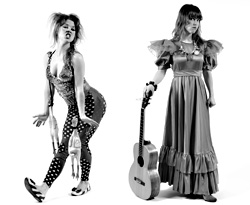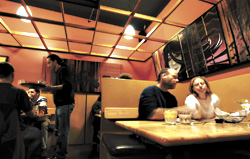“You know, you’re nothing but a wild mountain goat girl!” snapped an acquaintance of Seattle musician/performance artist Jeppa Hall five years ago. They’d locked horns in the past, but this time his response stopped Hall in her tracks.
“I’m an Aries, and I am always just nervous, like, ‘Ahhhh!'” she exclaims, with a comically raised brow and clenched fists, evoking what her 4-year-old self must have looked like. “So when he said that, I really felt that head-butting, fierce rutting thing. I thought, ‘Yes. I feel like that person. That goat girl.”
Hall, who was raised at the base of Salt Lake City’s mountains by a very young, imaginative, but troubled father (Hall was 3 when her parents split, leaving him a 21-year-old single parent to her and her younger brother), adopted Goatgirl as one of her stage personae. She’s since molded it into her primary musical outlet along with the magnificently disgusting/endearing/captivating Queen Shmooquan—a character born many years ago from escapism fantasy in high school—who reigns supreme over the fucked-up, psychedelic, vaudevillian kingdom of a bedroom with a cast of subjects that includes anyone she might deem fit for her wacky world, from audience members to her own “children,” a pair of floppy, pale-yellow rubber chickens.
“I saw her singing ‘Lucy in the Sky With Diamonds’ with Tripod at a Beatles tribute festival at the Re-bar a few years ago,” recalls former Sun City Girl Alan Bishop of his initial encounter with Hall’s performances. “She was schizophrenic onstage, morphing from one character to the next quite effortlessly…and with such confidence, completely annihilating the Lennon classic.”
Though the reactions to her creative endeavors run the spectrum from complete abhorrence to uncontrollable laughter, one thing Hall has never wanted for in her work is a response. It’s something she’s solicited since her early elementary-school days when she convinced one of her teachers to let her direct mini-productions, complete with costumes and casts, for the other classes in the building. Her dad came to her after having a parent-teacher conference, sat her down, and asked her what she wanted to be when she grew up.
“I was real nervous,” Hall recalls, wide-eyed. “And I said, ‘Ummmm, a ballerina? An actor?’ And he said, ‘Do you want to be an actor, Jeppa?’ He told me that my teacher had talked to him and said, ‘This girl needs to pursue acting.'”
“That was the year when my dad was a real serious coke addict…I mean serious coke addict,” she continues. “He was really fucked up at the time, and he kind of got this in his mind—’You’re like Brooke Shields and I’m Brooke Shields’ mom!’ He was a real scammer, y’know, and he’s sort of a grandiose—he was like, ‘Yeah we’re gonna make so much money off of you!’ And of course I was stoked.”
While there was no lack of enthusiasm, relying on a coke addict to get to auditions and performances proved more difficult. The big-screen dreams didn’t materialize (despite scoring an audition for a Kool-Aid commercial at the Osmond studios), but that didn’t stop Hall from going it alone, performing in school plays and singing in the Mormon church (which, though she was never officially baptized, she and her brother began attending on Saturdays so their dad and then-stepmom could have sex). She constantly tapped into her imagination while taking care of herself and her brother as their father struggled with addiction and a bipolar diagnosis, shopping for groceries, cooking meals, and at times lugging hot water from the stove up to the bathtub when their water bills went unpaid.
It’s a seemingly inexhaustible resource bubbling from within her. Now, at 32, Goatgirl and the Queen are her two primary outlets, and though the two personae (both of whom she refers to in the third person) are very different, there are similar undercurrents running through both. For someone of such tiny, compact, gymnastlike stature, she commands attention with a magnetic charisma, humor, and emphatic body language, dragging you, even against your will, into her worlds. Whether she’s slumped behind an acoustic guitar as Goatgirl, her Malvina Reynolds–like yowls delivering tales of love pursuits and daily struggles, or onstage in a wedding dress giving birth to an inflatable frog and stuffing it in a plastic bag, you have no choice but to be completely captivated by her performances.
“For me, anything that I have control over, they are one and the same,” Hall explains of the parallels between the two personae. “When I’m performing as Goatgirl, she is definitely a character, but more of just an inflation of myself—she is more of a caricature of myself, but I still really like to have that mask onstage. She also tells stories between songs; the performance aspect is really integral.”
Hall’s Goatgirl vocals are striking: a silvery warble bolstered by a steel-like scaffolding of self-assuredness. She recalls ’70s folk icons like Joni Mitchell with the candid, vivid tales she weaves with her music. And, not surprisingly, she cites as an influence American folk artist Peggy Seeger, who also performed satirical songs in a mixture of theater, comedy, and song.
As Queen Shmooquan, whom Hall considers her own personal vehicle for social change, it’s like she’s grabbing you by the hand and screaming, “Come along with me!” And you follow along in her glorious, terrifying, rainbow-colored wake, willing or not, into an abyss of subconscious fears, experiences, self-consciousness, loathing, hatred, love, political statements that range from denatured food to women’s body issues, birth, death, and whatever else may rise to the surface.
During a recent packed-house performance at the Rendezvous JewelBox Theater, with a hand-painted shrine of Mr. Rogers behind her, Queen Shmooquan’s antics ran the gamut from auditioning potential dates plucked from the audience, dressing them up in ridiculous costumes, interrogating them, and force-feeding them cheese puffs and Ho Hos to receiving her dead chicken babies in a coffin complete with trifolded American flag, delivered via USPS direct from Iraq. (Of the chicks, she says, “[Shmooquan’s] a mother to them in certain ways that my parents were a parent to me. She loves them when she needs them, like when she’s sad or feeling nostalgic or feeling sentimental. Then, at other times, she might use them to make herself look better; she might show off with them. She’s not consistently good to them.”)
“She considers herself an oracle, and she considers herself a transcendental being of sorts, and she’s a self-made diva,” Hall explains, of how she views Queen Shmooquan. “She’s pretty scrappy, but she’s very resourceful. And at this point, I think she’s very eager to be loved.”
For future Goatgirl performances, visit www.myspace.com/goatgirlmusic.






